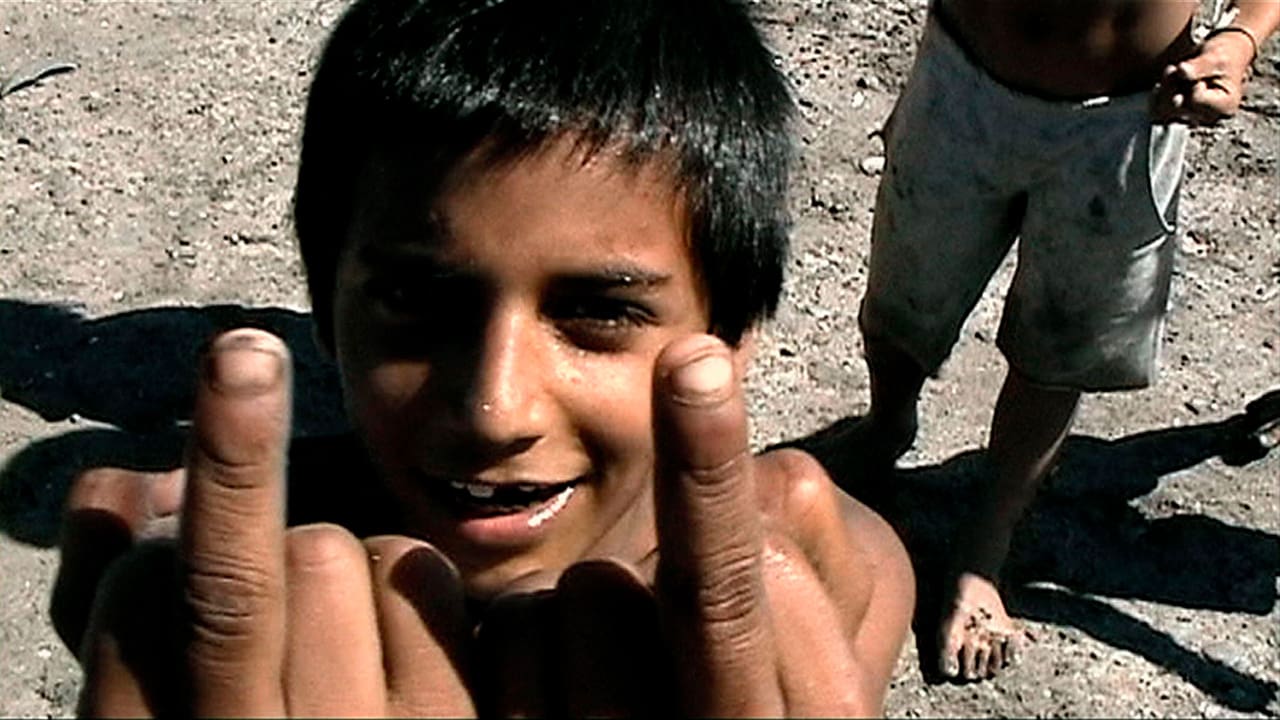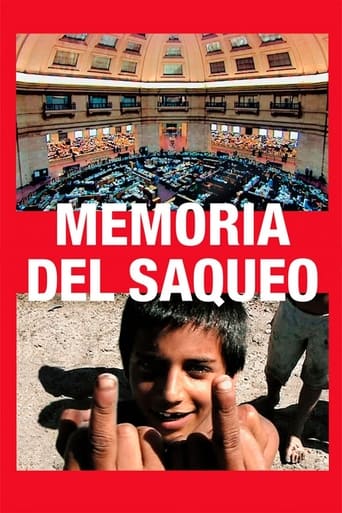Tedfoldol
everything you have heard about this movie is true.
Taha Avalos
The best films of this genre always show a path and provide a takeaway for being a better person.
Lela
The tone of this movie is interesting -- the stakes are both dramatic and high, but it's balanced with a lot of fun, tongue and cheek dialogue.
Winifred
The movie is made so realistic it has a lot of that WoW feeling at the right moments and never tooo over the top. the suspense is done so well and the emotion is felt. Very well put together with the music and all.
jfcippitelli
"fechy from Switzerland" you are sick bastard who doesn't know a thing from the great Pino Solanas. This man has been producing documentaries with strong political content since the 60s and you dare to consider him a bad copy of Michael Moore? He was 12 years old when Pino had already released his masterpiece The Hour of the Furnaces.How come you demand a little bit of humor when we are talking about the lives of millions of people that were ruined? Over the past 32 years they resisted a genocide dictatorial regime and governments financed by narcs. This is the result of liberal economic programs implemented by corrupt politicians in a fake democracy.Pino was a congressman also, the only one who dared to report the abuses during the Menem era. He received 6 bullets in his legs for it.This is a saga followed by The Dignity of Nobodies, Argentina Latente and the unreleased La Tierra Sublevada. We may discuss his political ideas but never his work. Something a lot of nobodies were longing to let the world know. Someone to speak for us. The social awareness of Evita, the revolutionary ideas of Che Guevara, the democratic values of the great nations and a gifted artist. Ladies and gentlemen that's Pino Solanas. A unique person.Pino thanks for your dignity, your humility, your coherence, your honesty and your legacy.
canallon40
I do not agree at all with the comment made about this film as I find it even malicious and narrow-minded. Who the hell cares if the film lacks structure or pacing? The most important thing is that real facts are well-presented and narrated very clearly. Regarding humour, I am afraid there's no room for humour in here. I recommend to whoever wrote that awful review to go and check out the latest Jim Carrey's film if he or she is looking for some humour. Unfortunately, I suspect that the author of such one-sided point of view cannot tolerate anything that does not come out of Hollywood whose films are indeed well-structured, well-paced and contain humour but at the same time are mostly idiotic, shallow and meaningless.
fechy
Michael Moore has done an outstanding service to documentary film-making, but he's also opened the floodgates for less worthy imitations.While poignant and probably deserving (Argentineans must be the judge of that), Solana's very long docu sadly belongs to this category.Sadly, because there is a great story to tell - not of social genocide perhaps as the filmmaker would want it, but of deeply misguided elites in a country blessed by the gods.The film lacks three of Moore's chief characteristics: pacing, structure, and humor.Dramatic but repetitive newsreel (or newsreel-like) images of street riots alternate with listless steadicam views of marble halls and government corridors. Cinematography is elementary, perhaps willingly, but disappointingly from such an accomplished filmmaker. Additional testimonials seem handicapped by the one-sidedness of the questions and by the superficial economic and historical analysis behind them. Structurally, the chapters (which are probably meant as theses) are ineffectual - they further obscure the narrative arc and provide no additional clues. The official thievery portrayed is poignant in its effects on everyday Argentinean life across all classes but offers no explanation as to why this country repeatedly trusts or elects demagogues who are lousy soldiers (the Junta who dragged the country into the Falklands disaster, and into the public debt load) or lousy managers (Menem and De la Rua). Seriousness of the topic should not have excluded an occasional bit of humor - surely, all this official strutting, all these implausible interview comments would have provided ample opportunities.
Chris_Docker
When I went to Argentina in 2002 it was a total culture shock in so many senses. Staying in Buenos Airies, there was no visible suggestion of Argentina being a 'developing country' - B.A. holds all the sophistication of 20th century Europe - and in some cases better preserved than it is in Europe. The architecture is visually stunning - walking along any of the main streets I was impressed with the elegance of this modern city that maintained traditional sophistication - not only in the beautiful buildings themselves, but in restaurants, etiquette and the arts. Going to the ballet, you could hear a pin drop (which is hardly the case in many Latin American countries). The citizens are educated, sophisticated and with refined manners. When you see scenes of rioting on television it takes a while to understand - Argentinians did not riot because they are lawless - they rioted against the lawlessness of the government, the institutions, the banks, the imposed social order that had robbed them of their savings, their livelihood, the small businesses they had built up, the investments they had made to protect for their children's' future and their own old age.How such a chaotic situation occurred in such a civilised country is a dilemma that is unique to Argentina. They have lost everything, and without a single bullet being fired, without a war, without even, sometimes, knowing the faces of the people that stole their personal and their country's wealth. I had taken some local currency with me for my own trip there, but had ignorantly thought I could simply use a credit card or change currency as needed. What a shock. The banks were suddenly closed "for a week". A law was passed in the short time I was there, I was informed, that made changing currency illegal. Moreover, most of the cash machines were now empty. The shops were full of the most fabulous bargains. Antique and bric-a-brac stores looked as if they had the entire contents of several stately homes which they were selling off for peanuts. No-one had any actual money. More than once, the banks had frozen people's savings and replaced their money with vouchers (that were worth very little).This is a situation that is so hard to understand, that a documentary film such as this was sorely needed to cover all the myriad facts.
A bloody military regime was succeeded by an apparent democracy, but successive leaders betrayed their ideals and, with the aid of banks and unscrupulous foreign investors, sold off Argentina's resources or privatised them to themselves with minimal checks and at a fraction of their real worth. Foreign banks kept their Argentinian subsidiaries 'private' so as not to be responsible for their debts. Private debts and corporate debts were absorbed into the national debt which increased pressure from the International Monetary Fund. Members of the government of all parties, heads of banks, and the Supreme Court all conspired on an ongoing basis with heavy subsidies (i.e. bribes) to keep the corrupt official in power and outside the rule of law. The greatness and meticulousness of the film is not, however, quite matched by the structure. At two hours long, the pacing is such that only students and persons already very interested in the problems of Argentina will remain glued to the screen. Although it is important for Argentinians to have their history documented clearly, it would be helpful for foreigners to be more aware of the situation, especially when much of the problem is the result of collusion by powerful governments such as that of the United States. Like many Latin American countries, Argentina has suffered pillaging first (militarily) by Spain and Europe and secondly (bureaucratically and financially) by the U.S.A. and foreign big business interests. Unlike many Latin American countries, Argentina has also been repeatedly pillaged by its own leaders. It is the only country in the world that has lost its major natural gas and oil resources without a struggle. One of the reasons we should learn from Argentina is because 'Democracy' is frequently placed on a pedestal by countries (and their people) such as U.S. and Britain. The latter are countries that have evolved democracy. Democracy installed before a country has grown towards it as a nation can result in government by bureaucrats - only corrupt (or corruptible) politicians - of any party - can get elected, so democracy is a farce. Once in power, they have at their disposal techniques and networks for their own enrichment that are beyond the comprehension of much the general populace, who realise, too late, that they have been fooled. Already in the USA we have seen a president elected by phoney ballots; in Britain, we have seen a government overhauled so that most decision-making is taken in private meetings. Democracy may be preferable to most systems of government, but it still depends on the integrity of individuals, and the ability of such individuals to be heard and elected. A corrupt democracy may be worse than a benign dictatorship; a communist agrarian system may work for a country for a period where the common good needs to be placed on a higher priority than civil liberties. Democracy is a wonderful institution, but there are many reasons for supporting it - some of them benign and some of them purely selfish. A study of this film could help persons interested in social anthropology to build a safer future for all of us. We need to be able to work through the flim-flam of government economic policies – if we cannot trust the integrity of our leaders then it is no good taking long range policies on good words and trust – as the millions of overnight destitute in Argentina have discovered to their cost.

